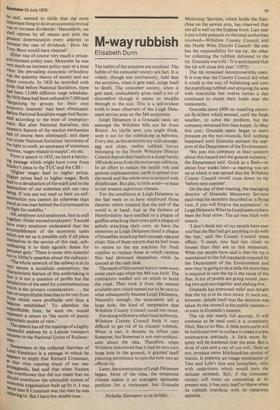M-way rubbish
Elisabeth Dunn
The habits of the scorpion are mythical. The habits of the consumer society are fact. It is widely, though not conclusively, held that the scorpion, when it gets mad, stings itself to death. The consumer society, when it gets mad, undoubtedly gives itself a lot of discomfort though it seems to muddle through in the end. This is a self-evident truth to keen observers of the Leigh Delamere service area on the M4 motorway.
Leigh Delamere is a Granada oasis set amongst the Wiltshire hills not far from Bristol. An idyllic spot, you might think, were it not for the rubbish-tip in between. Every day, as the motorists toy with sausage, egg and chips, twelve rubbish lorries belonging to the North Wiltshire District Council deposit their loads on a dump barely 100 yards away from the motorway cafeteria. In an effort to reduce the health risk and general unpleasantness, earth is spread over the muck and the whole area is sprayed with disinfectant. But alas, to little avail—at least in our present capricious climate.
For the conditions at Leigh Delamere in the last week or so have reinforced those theories which contend that the end of the world is at hand. Just as the farmers of Herefordshire have testified to a plague of gadflies attacking their cows and a plague of aphids attacking their corn, so have the motorists at Leigh Delamere faced a plague of houseflies attacking their sausage, egg and chips. One of them reports that he had twice to return to the tea machine for fresh supplies to replace those in which careless flies had drowned themselves while he queued at the cash desk.
The seeds of this surreal horror were sown some years ago when the M4 was built. The contractors needed soil on which to build the road. They took it from the nearest available spot which turned out to be next to what subsequently became Leigh Delamere. Naturally enough, the excavation left a large hole, the kind of temptation that Wiltshire County Council could not resist.
For along with every other local authority, Wiltshire County Council finds it very difficult to get rid of its citizens' rubbish. When it can, it decants its refuse into Somerset, but Somerset is not over-enthusiastic about the idea. Therefore, when Wiltshire discovered that it had its very own large hole in the ground, it granted itself planning permission to turn the hole into an official tip.
Later, the construction of Leigh Delamere began. Most of the time, the temperate climate makes it an averagely agreeable position for a restaurant but Granada Nicholas Davenport is on holiday. Motorway Services, which holds the franchise on the service area, has observed that not all is well on the hygiene front. Last year it put a little pressure on the local authorities involved—Wiltshire County Council and the North Wilts District Council : the one has the responsibility for the tip, the other for collecting the rubbish delivered to the tip. Granada was told : 'It is anticipated that the tip will close this year' (1975).
The tip remained incontrovertibly open. It is true that the County Council did what it could in the way of bulldozing soil over the putrefying rubbish and spraying the area with insecticide but twelve lorries a day continued to dump their loads near the restaurants.
Granada spent £800 on installing electrical fly-killers which seemed, until the freak weather, to solve the problem, but the company remained less than happy. In May this year, Granada again began to exert pressure on the two councils. Still nothing happened until Granada enlisted the support of the Department of the Environment.
'We join this company in their concern about this hazard and the general nuisance,' the Department said. Quick as a flash—or about four weeks later—a meeting was set up at which it was agreed that the Wiltshire County Council would close down its tip 'before next summer'.
On the day of that meeting, the managing director of Granada Motorway Services paid what his secretary described as 'a flying visit, if you will forgive the expression', to Leigh Delannere.What he found seems to have been the final straw. The air was thick with insects.
'I don't think any of our people have ever saidthat the flies had got anything to do with the tips,' said the County Council press officer. 'I mean, you find tips closer to houses than they are to this restaurant. What our people have said is that the tip is maintained to the full standards required by the Department of the Environment and now they're going to do a little bit more than is required in case the tip is the cause of the flies. A lot of people are going round, putting two and two together and making five.'
Granada has expressed relief and delight that the tip is to be shut down. It need not, however, delude itself that the decision was taken by the council in the public interest— or even in Granada's interest.
The tip was nearly full anyway. It will continue to be used until it is completely filled, flies or no flies. A little more earth will be bulldozed over its surface to make it a less unattractive spectacle. A little more flyspray will be scattered over the area. But a drop of rain and a ray of sun will, likely as not, produce more Hitchcockian armies of insects. It presents an image reminiscent of Tate and Lyle's lion and honeybees, only with undertones which would turn the delicate stomach. Still, if the consumer society will insist on consuming at its present rate, it has only itself to blame when its rubbish interferes with its rapacious appetite.


































 Previous page
Previous page